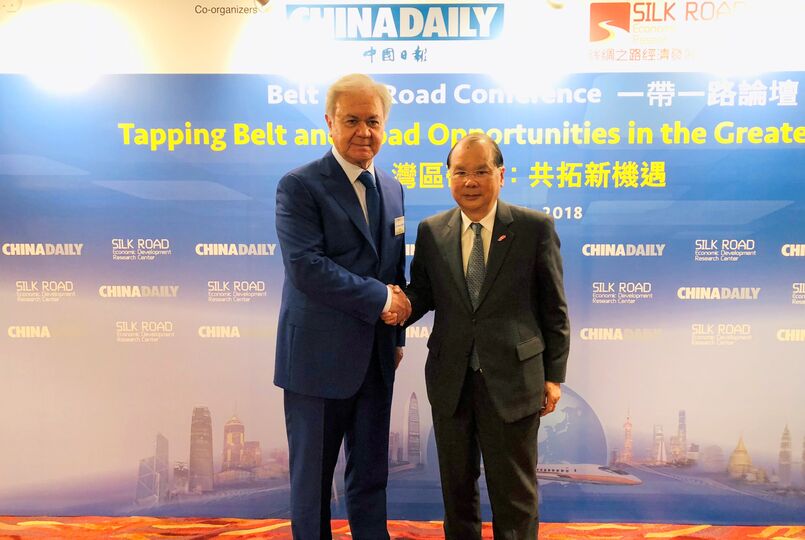On 29 October 2018, the second annual conference dealing with new opportunities for expanded regional business cooperation opened in the Hong Kong Special Administrative Region of the People's Republic of China.
The 2018 Belt and Road Conference is sponsored by the China Daily media holding and the Silk Road Economic Development Research Centre with the support of the Hong Kong administration. It involves representatives of institutions of state authority, the international business community, the academic community as well as media outlets.
Conference participants focus on expanded long-term regional trade and economic cooperation, including that of utilising Hong Kong's investment, technological and transport-logistics potentialities.
As a key conference speaker, SCO Secretary-General Rashid Alimov drew the attention of the conference participants to the new opportunities of regional economic cooperation in the context of admitting India and Pakistan into the SCO.
"After admitting India and Pakistan, the Shanghai Cooperation Organisation turned into the largest trans-regional organisation in the world; its potential and capabilities expanded, and new prospects for sustained joint economic development emerged," Mr Alimov noted. "Today, the SCO region stretching from the Arctic to the Indian Ocean and from the Pacific Ocean to the Baltic Sea is an attractive and promising area in terms of implementing business projects and new ideas here because it is marked by stability, dynamic development and constantly emerging new opportunities," he added.
The SCO Secretary-General told participants that, during the SCO summit in Qingdao, the leaders of SCO member states charted new venues for further streamlining diverse intra-SCO cooperation. In particular, Mr Alimov recalled that "in their Qingdao declaration, the leaders of SCO member states unanimously supported the creation of a favourable trade and investment environment for the purpose of gradually ensuring the free movement of goods, capital, services and technology, as stipulated by the SCO Charter. In this connection, the heads of the SCO member states passed a joint statement to simplify trade procedures." He also drew attention to the fact that the package of documents, adopted during the Qingdao summit, included decisions to incentivise tiny, small and medium-sized businesses, customs cooperation and also to expand the tourist industry as well as collaboration in the food sector.
"The meeting of the SCO Heads of Government Council, held 12 October in Dushanbe, was prepared in line with the agreements reached by the leaders of SCO member states. Documents passed by SCO heads of government in Dushanbe are consonant with implementing the decisions of the SCO summit in Qingdao," SCO Secretary-General pointed out.
In the context of finding new opportunities for expanded inter-regional cooperation, Mr Alimov drew the attention of those at the conference to a new aspect of incentivising cooperation between administrative-territorial divisions of SCO member states. "For these purposes, a special programme for expanding inter-regional cooperation between SCO member states will be drafted in the near future, and a forum of heads of regions of SCO member states will also be established. Forum participants are to hold their first meeting in Chelyabinsk, Russia, in December 2018. We see good prospects for involving Hong Kong's business circles in this SCO effort," Mr Alimov noted.
The Belt and Road Conference in Hong Kong involved over 300 participants and received extensive coverage from local and international media outlets. Hong Kong Chief Secretary for Administration Matthew Cheung Kin-chung addressed participants in the official opening ceremony.
In November 2017, Hong Kong hosted the first Belt and Road Conference that became a key event of an off-site session of the SCO Ambassadors Club. Speeches of the Club participants and various discussions paved the way for subsequent dialogue on matters concerning regional trade and economic cooperation, with due consideration for Hong Kong's trade and economic, technological and investment potentialities.
